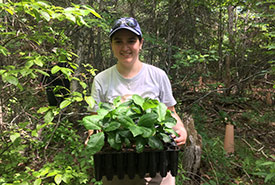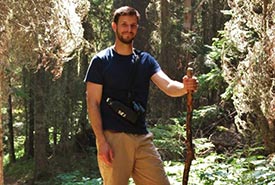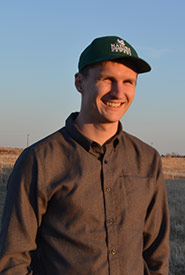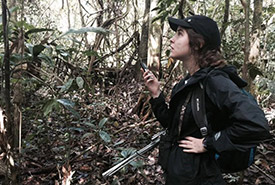Engaging interns in building a legacy

Laura Rincon, former GIS intern for NCC's Atlantic region (Photo by NCC)
Across Canada, there is an abundance of natural areas, from endangered grasslands in Saskatchewan to the rare, lush Acadian forested region of the Maritimes. These natural areas sustain a diversity of wildlife and plant species.
Here at the Nature Conservancy of Canada (NCC), we recognize the importance of protecting our country’s lands and waters. Their conservation is not only essential for nature, but for our quality of life — for today and for future generations.
NCC is inviting Canadians to join together in the single largest fundraising campaign for conservation in Canadian history. Our most ambitious fundraising initiative to date, the Landmark Campaign aims to raise $750 million to advance our conservation efforts, such as protecting over 500 new conservation projects across the country. Your support for NCC’s Landmark Campaign today will inspire future generations of Canadians to build on our legacy and lead increased conservation efforts in communities across the country.
Every year, NCC’s Conservation Internship Program engages young Canadians across the country in conservation work in an effort to inspire the next generation of conservation leaders. Whether it be working in the field or in NCC’s offices, interns are helping build NCC’s legacy of connecting Canadians with nature.
“I love the fact that there are organizations such as NCC that look after these diverse landscapes, which are inhabited by many species at risk,” says Laura Rincon, a GIS (geographic information systems) intern from NCC’s Atlantic Region. “Conservation should be important to everyone on this planet.”
Interns are engaging in stewardship work that helps guide and propel conversations around NCC’s conservation efforts. Conservation interns work alongside NCC staff and are the faces of our conservation work. From restoration efforts to biological inventories to invasive species removal, they do it all.

Matthew Goertz, former conservation intern for NCC's Ontario Region (Photo courtesy of Matthew Goertz)
“Most of our days consist of visiting all of the properties in our area and seeing what we can find. We like to see what’s inhabiting our parcels of land, such as species at risk and invasive species. A lot has to do with observation; we like to keep a good eye on the area,” says Matthew Goertz, a conservation intern working in Ontario’s Saugeen Bruce Peninsula natural area. “My work with NCC is important because I am one of those pairs of eyes and ears. As a summer intern, it’s a great place for me to learn, grow and sharpen my skills and help protect the environment.”
Behind the scenes, our communications interns spread the message of NCC’s conservation and stewardship work through creating content for our website and social media, inspiring Canadians to join us in our journey to conserve natural habitats and the species they sustain.

Logan Salm, former communications intern for NCC's Saskatchewan Region (Photo by NCC)
“Part of my job was trying to tell NCC’s story and educate the public on why we’re so important,” says Logan Salm, communications intern for NCC’s Saskatchewan Region. “We forget how important nature is to us as humans, as it filters our water and gives us clean air. Nature has a right to exist on its own, and we have the power to help save it, so I think we should.”
“We need more education and more helping hands,” says Matthew. “Without people being involved and knowledgeable about conservation, there won’t be any effect.”
“I think that we are on the right track for the future of conservation, as generations today have a greater understanding of the issues facing biodiversity and of the actions needed to mitigate these issues than they did in the past. Conservation technology has also advanced significantly, but we still have a long way to go,” says Cassia Foley, NCC’s national conservation planning summer intern. “Going forward, I think it is important that we recognize the impacts we have on the environment and how we can reduce our footprint in our everyday lives. I also believe it is important to instill a love of nature in children from a young age. The more that individuals invest themselves in nature and conservation, the better off we are in helping protect biodiversity.”

Cassia Foley, former national conservation planning intern (Photo by NCC)
NCC’s interns are our champions for conservation, as we build a community of young nature enthusiasts. By inspiring Canadians and providing them with meaningful and engaging work, NCC’s Conservation Internship Program is providing today’s youth with a unique opportunity to develop their skills and become tomorrow’s conservation leaders.
“Working as an intern at NCC has cemented my idea that I want to work in the environmental sector,” says Logan. “It has opened my eyes to how many opportunities there are in the field because there is so much to be done. We can do better, and seeing that on the ground has been important for me, and it definitely informs the choices I make in the future.”
We need to do more, faster. We need to accelerate the pace of conservation, to stop and reserve the damage. The time is now, and we can’t do it without you. Your support will help us conserve more land faster.
“Once it’s gone, it’s gone,” says Matthew. “You have to look very far ahead in time, as what you do now will affect the future.”

